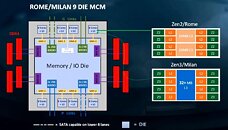Tuesday, April 7th 2020

AMD Ryzen 4000 Rumored to Bring 15% IPC Uplift
AMD's Zen 3 architecture will power the next generation Ryzen 4000 desktop chips and the 3rd Gen EPYC lineup which are both expected to launch later this year. Adored TV has received some leaked information detailing the technical specifications of the Zen 3 architecture. The majority of the leaked information confirmed existing rumors such as the 8 core CCX, higher clocks and lower power draw.
However the leak suggests IPC improvements will be less than the expected 20% hinted at by AMD and may end up being closer to 10 - 15%. The leak also claims that L3 cache will remain at 32 MB however it will no longer be split due to the single CCX. While this may be disappointing for some, remember to take the claims with a grain of salt as with any rumor.
Source:
Adored TV
However the leak suggests IPC improvements will be less than the expected 20% hinted at by AMD and may end up being closer to 10 - 15%. The leak also claims that L3 cache will remain at 32 MB however it will no longer be split due to the single CCX. While this may be disappointing for some, remember to take the claims with a grain of salt as with any rumor.

54 Comments on AMD Ryzen 4000 Rumored to Bring 15% IPC Uplift
The CCX complex is now 8-core, up from 4-core previously.
Zen 4 will likely be 16-core on one chiplet.
All improvements in performance per core will be appreciated, but let's not conclude until we have some real information.
There's no point in having 16 cores in one chiplet when the vast majority of CPU's sold are 8 cores or less, that's a huge waste of die area.
Imagine a 4600X being sold with TEN cores disabled.. :roll:
Remember, this is still 7 nm, only a tad better than the current one, so the chances of seeing AM4 CPU's with more than 16 cores are extremely slim.
Also, Big Navi tomorrow and Intel's 5nm 11th gen tested! :roll:
Mark Papermaster already officially stated that MORE CORES are coming :D
Get ready for MORE CORES!
www.tomshardware.com/news/amd-cto-mark-papermaster-more-cores-coming-in-the-era-of-a-slowed-moores-law
Still, disabling 10 out of 16 cores is a bad idea, maybe we'll see more than one kind of chiplet.
Also, as long as the sales of 16 core CPU's won't ramp up we won't be seeing a higher core count in mainstream desktop anytime soon.
TR and Epyc is a different story tho, core count will keep on climbing there.
On a side note, I'm still curious if putting the first 8 cores with lower latencies on the IO chip would improve the gaming performance.
Imagine CPU's with 8 cores or less only having one single chip with both IO and cores, while those with more cores have one or two more chiplets with 8 cores each.
8 core Ryzen: one die with both IO and cores (old school style).
16 core Ryzen: one die with both IO and cores, plus one chiplet with 8 cores.
24 core Ryzen: one die with both IO and cores, plus two chiplets with 8 cores each.
Their lineup may look like this:
Ryzen 9 5950X 32-core
Ryzen 9 5900X 24- or 28-core
Ryzen 7 5700X 16-core
Ryzen 5 5600X 12- or 14-core
Ryzen 5 5500G 8-core APU with Navi
Ryzen 3..... etc Dali APU Zen 3 with Navi.
Also, Threadripper can become 64-core, while EPYC 128-core for sure.
AMD said two things:
- Zen 2s 15% gain is higher than evolutional upgrades usually have
- Zen 3 is expected to bring similar gains as new architectures (opposed to evolutional upgrade) do
They never said it's higher (or lower for that matter) than the 15% Zen 2 got, nor did they even hint such. Only thing about Zen 3 performance they said is "it's IPC gains are in the range people usually expect from new architecture"
BTW, this’ll be the 4th version of Ryzen, and 3rd (and half, countin Zen+ as half) generation of the Zen architecture.
EDIT: We have nearly the same hardware! Both 2700X+Vega 64+X470+16GB DDR4 3200+NVMe!
OS, games and other programs do not like heteregenous core. They like when everything is the same and react the same way. Some handle this setup better (like linux run better on threadripper second gen), but they aren't still as fast as a processor without NUMA nodes.
Also i do not recall seeing 2-% for Zen 3. The number was always between 10-15% (most people said around 15%)
Imagine someone who bought a Ryzen 1600 in Q2 2017, updated to Ryzen 3600 in Q4 2019, further updating to a used 4900X somewhere around 2022 (or even used 3950X in 2021 if the Zen 3 series prove not to be compatible). I think AM4 is the most successful platform ever, better than LGA775. He's gonna enjoy a highly performing computer for around 6 years without changing any other component.
Zen3 being an entirely new architecture, you can kind of see why people are expecting >15% IPC gains.
For people wondering, the quotes were from Forrest Norrod of AMD if you want to look them up in regards to Zen3 performance that people are reading in to.
Zen 3 and Zen 4 will still be members of the Zen family, if it was a major architectural overhaul AMD would for sure come up with a different name to distinguish them. So we should expect small to medium architectural changes, which may of course still be solid improvements.